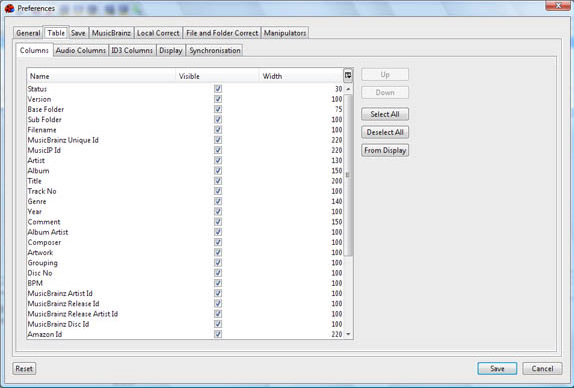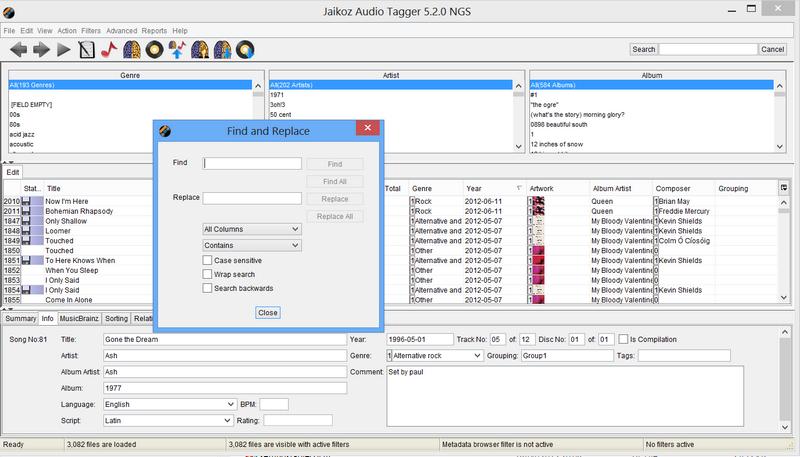

- #Jaikoz tutorials update#
- #Jaikoz tutorials manual#
- #Jaikoz tutorials software#
- #Jaikoz tutorials download#
- #Jaikoz tutorials windows#
#Jaikoz tutorials software#
Some discrete features in this software include playlist creation, bulk rename, directory rename, and directory restructure.Additionally, a status bar and activity log under the three panes have made the application much smoother and user-oriented. This software is incredibly user-friendly, and functions are programmed in a distinct way that you have imagined.ĮasyTag software is characteristically different, as an illustration three vertical panes are used for the bulk application window, namely file tree/list view, the tag editor, and the files in the current directory.

This popular software supports various files, such as MP2, Mp3, Mp4, AAC, FLAC, MusePack, WavPack, and Monkey’s Audio. EasyTagĮasyTag music tag editor software is widely used on the Linux platform to perform beyond the ID3 tags.
#Jaikoz tutorials download#
Moreover, a reader can download the auspicious software from this page hence, the download link has been given here too. All the relevant information, properties, performance efficiency, and features have been depicted in this article in detail. This article has been written regarding the best music tag editor software available on the Linux platform. The primary purpose of using the audio tag editor is to organize and correct the files to perform smoothly. Apart from that, there are many more audio tags such as FLAC, OGG, AIFF, Mp3, Mp4, MWA, and WAV, etc. As for composers/artists, SongKong is on the right track "normalizing" the names.ID3 is the most common type of audio tag, and there are two distinct types, namely, ID3v1 and ID3v2. and even the orchestra: Wiener Philharmoniker-> Vienna Philharmonic, Harmonie českých filharmoniků ->Czech Philharmonic Orchestra. as well as the key: C-mol, -> C Minor, G-dur -> G, etc. It would operate on the music "form" Sonate->Sonata, Violinkonzert->Violin Concerto, etc. ) Similarly would really help having a search and replace capability.
#Jaikoz tutorials manual#
Manual overrides much needed and could use some extra support in the "spreadsheet-style" editing (such as replicating the current column (currently only supports replicating the first row. Reason: easier to delete the album from the intermediate folder and re-start the process.
#Jaikoz tutorials update#
I'm spending a lot of time doing these "manual tweaks" and find it's easier to update my new iTunes library on an album by album basis from my existing iTunes library, going through an intermediate folder, before doing the move the the new iTunes "automatically add to iTunes" folder. With the classical albums, the "work and movement" support really helps - I often have to do "manual tweaks", but SongKong does do a lot of the "information gathering and presentation" from the on-line databases.

really helps when navigating my music library in iTunes.

Providing consistency in the filename, conductor, composer, artist, etc. If the tracks are a decent quality and the release is in the Musicbrainz or Discogs database, Jaikoz will correctly tag the tracks with an over 99% accuracy.Ī very useful tool in organizing my 1000+ albums (mostly Classical). Overall the accuracy is very good though.
#Jaikoz tutorials windows#
(I'm running Jaikoz on a server with 2 CPU, 8 core each, 64GB of memory Windows Server 2019 standard, 4 OCZ Vertex 4 250Gb SSD and 500Mbit internet connection). Also memory use frequently exceeds 12GB when a larger collection is loaded. Any larger than this and the GUI gets sluggish and so once in a while just stops responding all together for a few seconds. Though Jaikoz looks fairly professional, some file handling and database optimization really needs to be done for collections of over 100k tracks locally on SSD, or about 50k when this collection resides on external storage like a NAS. MP3tag is a lot faster with Musicbrainz, though not with Discogs. Also the update from Musicbrainz is terribly slow most of the time, though I strongly suspect this is the Musicbrainz API most of the time and not necessarily Jaikoz. You have to go through every release one by one and check these by release if you want metadata updated or added. What disturbs me a little is that the automatic correction does not update metadata when there is already some basic data there. The overall ease of use and layout is petty good.


 0 kommentar(er)
0 kommentar(er)
